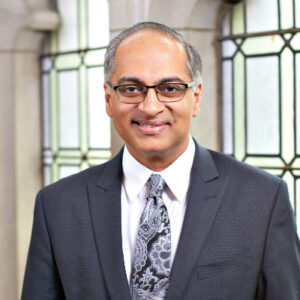More than We Already Know: Celebrating the Work of Interreligious Learning
The Center for Multi-Religious Studies presents “More than We Already Know: Celebrating the Work of Interreligious Learning” with Rev. Dr. John Thatamanil on Wednesday, April 26 at 5:00 pm PT.
Introduction
Religious diversity is often presented as a problem to be solved. Conversations about “the problem of religious diversity” are routine. Rev. Dr. John Thatamanil suggests that rendering the religious other as a problem is itself problematic. What if we instead perceived religious diversity as a promise to be received, rather than a problem to be solved? Just as in ecological thought, wherein diversity is a boon, rather than a bane, might religious diversity be framed as an intrinsic good? One way to do so is to say that we have more to learn, more than our tradition already knows, from our religious neighbors, precisely because they have different vocabularies, practices, and insights than we do. Moving toward the other in open-hearted receptivity is, therefore, simultaneously a move into deeper proximity to ultimacy. No movement towards the divine can exist without a commensurate movement toward one’s neighbor. Celebrating religious diversity thus represents not just an ethical good—but also a theological good.
Watch the Recording
Meet Our Guest Speaker

Rev. Dr. John Thatamanil
- Professor of Theology & World Religions Director, Insight Project: Theology & Natural World, Union Theological Seminary
- Volunteer Priest Associate and Diocesan Theologian, The Anglican Church of St. John the Divine, Victoria, BC Diocese of Islands and Inlets
- B.A., Washington University, 1988
- M.Div., Magna Cum Laude, Boston University, 1991
- Ph.D., Boston University, 2000
John J. Thatamanil teaches a wide variety of courses in the areas of comparative theology, theologies of religious diversity, Hindu-Christian dialogue, the theology of Paul Tillich, theory of religion, process theology, and ecotheology. He is committed to the work of comparative theology—theology that learns from and with a variety of traditions. A central question that drives his work is, “How can Christian communities come to see religious diversity as a promise rather than as a problem?” He is also committed to Dzogchen meditation and includes time for meditation in virtually all of his courses at Union.
Professor Thatamanil’s first book is an exercise in constructive comparative theology. The Immanent Divine: God, Creation, and the Human Predicament. An East-West Conversation provides the foundation for a nondualist Christian theology worked out through a conversation between Paul Tillich and Sankara, the master teacher of the Hindu tradition of Advaita Vedanta.
Professor Thatamanil’s second book, Circling the Elephant: A Comparative Theology of Religious Diversity (Fordham University Press, 2020) takes up the recent and extensive literature on the Western construction/invention of the category “religion” with the following questions in mind: If “religion” is a relatively recent invention of the modern West, then is the category applicable to non-Western cultures and traditions? Can we really divide the world up into a set of discrete world religions? Does it still make sense to ask if the world’s “religions” are paths up the same mountain or paths up different mountains? How should theologies of religious diversity be reconfigured in light of these new questions and challenges?
Professor Thatamanil is working on a third book provisionally entitled, Desiring Truth: Comparative Theology and the Quest for Interreligious Wisdom. This book begins by interrogating our troubling post-truth moment: just how did we get here? Taking up an argument made by the late Foucault, Thatamanil argues that the answer partly lies in the modern commitment to separating desiring from knowing in the name of objectivity. By contrast, Buddhist and Hindu traditions insist that without rectifying our desires, there is no possibility of coming to right knowing and genuine wisdom. Thatamanil turns to comparative theology as a resource for addressing a contemporary context rife with misinformation, conspiracy theories, and “alternative facts.”
Professor Thatamanil is a past-president of the North American Paul Tillich Society (NAPTS) and the founding (and current) Chair of the American Academy of Religion’s Theological Education Committee. He is a frequent preacher and lecturer in churches, colleges and universities both nationally and internationally. He also co-edits (with Dr. Loye Ashton) the “Comparative Theology: Thinking Across Traditions” book series for Fordham University Press. He blogs regularly for a variety of online publications and has published editorials in The Los Angeles Times and The Washington Post.